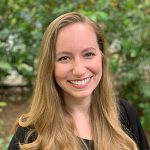Doctoral and Postdoctoral Training
In addition to our PhD in Nursing Science program, the UW School of Nursing offers several opportunities for enhanced training in specific areas of nursing science. Trainees in these programs are generally supported via fellowships.
Pre- and Post-Doctoral Training – Research in Nursing & Global Health (RiNGH)
Global health is a multi-disciplinary field that aims to improve health equity for individuals, families and populations. Research in this field recognizes that health issues transcend national borders and seeks to understand public health problems, inform health interventions, optimize health services and systems, and promote health. Within the United States, innovative global solutions and approaches can be adopted to address local health concerns.
The Research in Nursing and Global Health (RiNGH) training program, funded by the National Institute for Nursing Research (T32 NR019761) and coordinated by the school’s Center for Global Health Nursing and the Office of Diversity, Equity and Inclusion, prepares junior scientists with knowledge and skills to advance global health equity through team-based, interdisciplinary research. This training grant offers pre-doctoral traineeships and post-doctoral fellowships of up to 2 years to support enhanced education, scholarly mentorship, and career development.
To be eligible for appointment for this research training program, applicants must be US citizens or permanent residents. Pre-doctoral trainees must have been accepted to the University of Washington PhD in Nursing Science academic degree program. Post-doctoral fellows must have completed a research doctorate in nursing science or related field by the time of appointment.
Apply: Predoctoral Applicants
- Application materials and instructions are available here
- Applications accepted on a rolling basis, even after first consideration deadlines below; however review will be dependent upon available trainee slots
- For start between Autumn 2022 and Summer 2023, applications open now
- For start in Autumn 2023, first consideration deadline is January 31, 2023
- Before submitting an application, we encourage inquiries first. Please e-mail cghn@uw.edu Application materials must be submitted via e-mail to cghn@uw.edu
Apply: Postdoctoral Applicants
- Application materials and instructions are available here
- Applications accepted on a rolling basis, even after first consideration deadlines below; however review will be dependent upon available trainee slots
- For start between Autumn 2022 and Summer 2023, applications open now
- For start in Autumn 2023, first consideration deadline is January 31, 2023
- Before submitting an application, we encourage inquiries first. Please e-mail cghn@uw.edu
Application materials must be submitted via e-mail to cghn@uw.edu
For more information about the Research in Nursing and Global Health (RiNGH) training program, please contact cghn@uw.edu
Pre- and Post-doctoral training program: Interdisciplinary Nurse Scientist Training in Multilevel Approaches: Biology to Society (B2S)
 To meet the goals of precision health, there is an urgent need to develop the next generation of nursing scientists poised to lead interdisciplinary teams that integrate ‘Omics’-based measures with clinical outcomes research. To accomplish this, a concerted effort needs to be made in the training of nursing science doctoral students and postdoctoral trainees with skills necessary to incorporate and evaluate Omics (genomics, metabolomics, transcriptomics, microbiome, genomics, epigenomics) using a systems ecology lens. The University of Washington School of Nursing has a long history in building biobehavioral nursing science capacity. Our goal is to expand this capacity by integrating Omics tools, interdisciplinary educational and multilevel (individual, micro-, neso-, exo- , macro- and chronosystems) approaches into our doctoral and postdoctoral training.
To meet the goals of precision health, there is an urgent need to develop the next generation of nursing scientists poised to lead interdisciplinary teams that integrate ‘Omics’-based measures with clinical outcomes research. To accomplish this, a concerted effort needs to be made in the training of nursing science doctoral students and postdoctoral trainees with skills necessary to incorporate and evaluate Omics (genomics, metabolomics, transcriptomics, microbiome, genomics, epigenomics) using a systems ecology lens. The University of Washington School of Nursing has a long history in building biobehavioral nursing science capacity. Our goal is to expand this capacity by integrating Omics tools, interdisciplinary educational and multilevel (individual, micro-, neso-, exo- , macro- and chronosystems) approaches into our doctoral and postdoctoral training.
The University of Washington School of Nursing B2S Training Program,, funded by the National Institute of Nursing Research (T32016913). The grant provides opportunities for pre-doctoral traineeships and postdoctoral fellowships of up to 2 years to include specialized coursework and seminars and focused development in omics approaches to examine issues related to related to multilevel intervention and evaluation.
To be eligible for appointment for this research training program, applicants must be US citizens or permanent residents and qualified as a Registered Nurse. Pre-doctoral trainees must be accepted to the University of Washington PhD in Nursing Science Training Program. Postdoctoral fellows must have completed a research doctorate in nursing science or related field by the time of appointment.
Predoctoral Trainees
Post-doctoral trainees
Fatemeh Choupani |
Alumni
Jonathan Auld, PhD, RNDr. Auld received his PhD in nursing science from Oregon Health & Science University, and Masters in Science degree and clinical nurse leader certification from the University of Portland. His career goal is to become an influential nurse scientist with an innovative and productive interdisciplinary program of research dedicated to understanding the interaction between heart failure symptom biology, patient behaviors, and patient outcomes. A central aim of his research is to elucidate how symptom biology and the patient response to symptoms in people with heart failure differ in order to develop more targeted and effective interventions. Dr. Auld received RIFP grant funding for his research activities during his post-doctoral fellowship. He completed his post-doctoral training in May 2020, and is now a tenure-track Assistant Professor at the University of Washington School of Nursing. He was awarded a K23 in September 2020 “Symptom Biology After Heart Failure Hospitalization” to continue this line of inquiry. |
 |
Karl Christie Figuracion, MSN, ARNPKarl Cristie F. Figuracion is dedicated to working with patients with cancer, especially those with primary and secondary central nervous system malignancy. In 2011, she graduated from San Diego State University with a BSN and worked as an inpatient oncology nurse. Shortly after, she moved to Durham, North Carolina to attend Duke University School of Nursing Adult-Gerontology and Adult-Oncology Nurse Practitioner program. Additionally, she received clinical training at Duke Cancer Institute, Preston Robert Tisch Brain Tumor Center, and graduated in 2014. During her master’s degree, she was awarded the Bonnie Jones Friedman Humanitarian Award, Sigma Theta Tau International Honor Society of Nursing, and American Cancer Society Graduate Scholarship in Cancer Nurse Practice. As a nurse practitioner at the Alvord Brain Tumor Center, she is clinically trained in managing the side effects of both radiation and chemotherapy. Ms. Figuracion is interested in symptom science, understanding the mechanisms underlying, and discovering interventions to prevent and manage chronic neurological symptoms related to the brain tumor and its treatment. For her dissertation, she plans to focus on cancer survivorship and use radiomics in evaluating factors that influence cerebral atrophy among brain tumor survivors. |
 |
Jonika Hash, PhD, RNJonika Hash, PhD, RN, completed her PhD in Nursing Science at the University of Washington in 2017 and completed her post-doctoral fellowship in Winter 2020. Her research involves sleep health among young children and their parents experiencing adversity. She explores how sleep health relates to adversity, social-emotional development, and biomarkers and on promoting the health and wellbeing of children and their parents, particularly those in underserved communities. She received foundation research funding from Sigma International “Sleep health knowledge, attitudes, beliefs, and practices among underserved mothers with a history of prenatal depression” while a post-doctoral fellow. She is now a tenure-track Assistant Professor at the University of Washington School of Nursing. |
 |
Hyejeong Hong, PhD, RNDr. Hyejeong Hong received her PhD in Nursing at Johns Hopkins University, and she earned her master’s degree in Family Nurse Practitioner at the University of Illinois at Chicago (UIC). Her dissertation work focused on developing a prediction model of aminoglycoside-induced hearing loss among multidrug-resistant tuberculosis (MDR-TB) infected individuals in South Africa. Her research interest is tuberculosis susceptibility, bioinformatics, and global health. She expanded the work she completed as a doctoral student by pursuing a postdoctoral fellowship on the Omics and Symptom Science T32 training program at the University of Washington, Seattle, supported by the National Institute of Nursing Research (T32NR016913). As a postdoctoral fellow, Dr. Hong has had the opportunity to study host-pathogen interactions and genetic control of the innate immune response to Mycobacterium tuberculosis (Mtb) infection. The goal of her current project is to identify mechanisms by which some individuals resist Mtb infection. Her clinical practice as a primary care family nurse practitioner encompasses health promotion, disease prevention, health maintenance, counseling, patient education, diagnosis and treatment of acute and chronic illnesses. Dr. Hong is currently an Assistant Professor- Tenure Track at the University of Pennsylvania. |
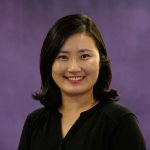 |
Sarah Martha, PhD, RNDr. Sarah Martha received her BSN and PhD from the University of Kentucky, College of Nursing, and holds a BS in Biology from Portland State University. Her primary research interest is in advancing our understanding of the pathology of acute ischemic stroke (AIS) and the trajectory of recovery in order to improve patient symptoms, cognitive and functional outcomes, and quality of life. Her passion for AIS research emerges as a result of her professional and academic background, blending her experiences in neurosurgical intensive care nursing with her training as a bench scientist. Dr. Martha’s dissertation research focused on understanding neuroinflammation and pathology relating to AIS outcomes in rodent models and patients. In 2018, she was selected to participate in the National Institute of Nursing Research Summer Genetics Institute. Currently, her research explores the potential of metabolomics for precision health in AIS pathology and associated symptoms and outcomes. Dr. Martha was awarded a K23 in 2021 from NINR to further her research efforts in lipidomic mechanisms of symptom development following stroke. She is currently an Assistant Professor- Tenure Track at the University of Illinois-Chicago. |
 |
Yvette Rodriguez, BSN, RN |
|
Angelita Utleg, MS, RNMs. Utleg has a BA in Biology, MS in Biomedical Science, an AS in Nursing, and a certificate in Biomedical & Regulatory Affairs. She has more than ten years of experience working in research laboratories with human samples. Her current research interest is to use a metabolomics approach to understand the relationships among symptoms, the human microbiome, and dietary lifestyle. Her dissertation is focusing on investigating the relationships among diet, fecal short-chain fatty acid (SCFA) metabolic profile, bacterial taxa, and GI symptoms in healthy women and women with Irritable Bowel Syndrome (IBS). SCFA profiles may play an important role in inflammatory response and pain in a subgroup of patients with IBS. Comparing the fecal SCFA levels of healthy women and patients with IBS may shed light on the mechanisms underlying the IBS symptoms. The goal of this line of research is to enable personalized dietary recommendations based on evidence-based data that could be tested in future clinical trials to reduce IBS symptoms. This work is funded by an Individual Kirschstein NRSA from NINR F31NR018794. |
 |
Alexi Vasbinder, BSN, RNAlexi Vasbinder, BSN, RN completed her BS in Psychology from the University of Michigan in 2015 and her BSN from Michigan State University in 2016. Her research focuses on one of the most commonly reported symptoms in cancer survivors, fatigue. Radiation is hypothesized to cause fatigue through pathways of inflammation; however, the mechanisms driving long-term fatigue (LTF) after treatment has ceased, is less clear. For breast cancer survivors, radiation can also cause reductions in heart function, which can produce LTF. Evidence also supports the role of oxidative stress in LTF. Given multiple pathways are likely involved in LTF in patients receiving radiation, biomarkers targeting different mechanisms may provide greater insight into the mechanisms leading to LTF and future interventions. Ms. Vasbinder is using samples from the Women’s Health Initiative (WHI) Life and Longevity After Cancer (LILAC) in her dissertation project which is funded by an individual NRSA from NINR 1F31NR018588. |
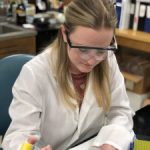 |
Tao Zheng, MN, RNTao Zheng started his nursing education at North Seattle College where he received his Licensed Practical Nursing and Registered Nursing degrees. With a passion for higher education and professional development, he then received his BSN degree from Olympic College in 2012 and his MN from the University of Washington Tacoma in 2014. Clinically, Mr. Zheng has worked in the cardiothoracic intensive care unit and clinical cardiology. In his previous position as a Clinical Nurse Educator at the University of Chicago Medicine, Mr. Zheng was heavily involved in nursing research and evidence-based practice projects. He is interested in symptom science among patients and caregivers in the advanced heart failure population, particularly in individuals living with mechanical circulatory support devices. For his dissertation, Zheng plans to focus on fatigue and sleep-related impairment and discovering interventions to promote positive patient and caregiver outcomes in this population. |
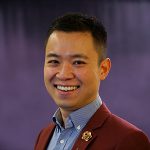 |
Apply: Predoctoral Applicants
All application materials for the PhD in Nursing Science Program need to be submitted as per graduate application instructions by December 1.
In your application materials to the PhD in Nursing Science Program, please denote in the Research Focus statement section of the application that you would like to be considered for the Omics and Symptom Science Training Program.
Apply: Postdoctoral Applicants
The priority deadline for post-doctoral fellowship applications is January 31.
Applicants should provide:
- a cover letter explaining what they hope to gain from a postdoctoral fellowship, including research interests and goals and how they align with the training provided in this T32.
- a copy of their current CV
- 1-2 samples of scholarly writing (journal articles, essays)
- 3 letters of recommendation. These letters should be sent electronically directly to the training program directors from the recommender (not from the applicant) and should speak to the applicant’s scholarly abilities, areas for growth and future potential.
All application materials need to be sent electronically to the Training Director Heitkemper’s assistant Ms. Wendy Herzog (wherzog@uw.edu) by January 31.
For more information about the Omics and Symptom Science Training Program, please contact either of the co-directors Dr. Margaret Heitkemper (heit@uw.edu) or Dr. Hilaire Thompson (hilairet@uw.edu).
Postdoctoral Trainees funded by Other Sources
Jeehye Jun, PhD, RNJeehye received her PhD from the University of Illinois at Chicago in 2022 and is currently working with Executive Dean Emami on her research project Home music intervention for persons with dementia and their family caregivers. Dr. Jun’s current research focuses on healthy aging, chronic illness, and technology-based research. As a postdoctoral fellow, she is a member of a multidisciplinary, multisite team that is testing an innovative approach involving the use of biomarkers to measure stress in people living with dementia and their family caregivers. Her main roles are to perform data analyses, write and publish scientific papers, and develop research grant proposals. This experience is enhancing her preparation for future work as a university professor and her research on intervention development for reducing symptom burden in family caregivers for people with chronic illness. |
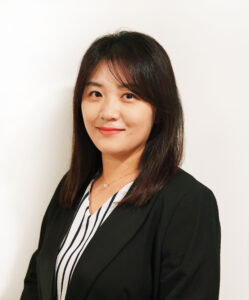 |
